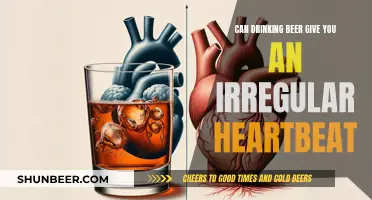
Drinking beer, or any alcoholic beverage, can lead to intoxication, which is often colloquially referred to as being drunk. Alcohol intoxication can affect mood, speech, judgment, and more. The experience of being drunk can feel different for everyone, but it commonly results in a decrease in inhibitions and a heightening of emotions. Beer specifically tends to have a relaxing effect and doesn't provoke aggression like other spirits.
Characteristics of Drinking Beer
| Characteristics | Values |
|---|---|
| Feelings | Warm and cozy, vibrating, excited, confident, relaxed, sleepy, bloated, drunk |
| Social behaviour | Talkative, friendly, uninhibited, loud, dancing, singing |
| Cognition | Poor judgment, lack of coordination, slower reaction time, confusion, memory loss, blurred vision |
| Physical appearance | Reddened face, weight gain |
| Health | Dehydration, hangover, vitamin B-1 deficiency, kidney stones, liver problems, heart issues, coma, death |
What You'll Learn

Relaxed and sleepy
Drinking beer can make you feel relaxed and sleepy. Beer has a reputation for its relaxing effects and typically doesn't provoke aggression like other spirits. It can also make you feel bloated.
The experience of drinking alcohol is different for everyone, but it commonly results in a decrease in inhibitions and a heightening of emotions. When you drink, alcohol enters your bloodstream and affects your brain and body functions. As you drink more, your body and brain functions slow down.
The more alcohol you consume, the stronger its effects on the body. Being very drunk can be dangerous and can cause seizures, dehydration, injuries, vomiting, coma, and even death.
The first sign that alcohol is affecting your body is when you start to feel tipsy. This usually happens after a man consumes 2 to 3 alcoholic drinks in an hour or a woman consumes 1 to 2 alcoholic drinks in an hour. At this stage, you might feel more confident and chatty, and your reaction time might be slower.
As you continue to drink and reach a higher blood alcohol content (BAC), you might start to feel relaxed and sleepy. Your coordination and reflexes will decline, and you might experience slight changes in mood. You might also feel more talkative or euphoric and have less inhibition.
It's important to note that drinking alcohol can be addictive and have negative health consequences. It's always best to drink in moderation and be aware of the potential risks associated with excessive alcohol consumption.
Drinking Beer and Driving: What's the Legal Limit?
You may want to see also

More confident and chatty
Drinking beer can make you feel more confident and chatty. Alcohol is a central nervous system depressant, and as it affects the brain, it can make you feel more relaxed and less inhibited. This can lead to increased confidence and sociability.
When you drink, alcohol enters your bloodstream and affects your brain and body functions. As a depressant, it slows down your body and brain functions, including your breathing, relaxes your muscles, and impairs your thinking. This can result in slurred speech, lack of coordination, and slower reaction times.
The effects of alcohol can vary depending on several factors, including your weight, gender, metabolism, and how much you've had to eat or drink. Generally, men can drink more than women before feeling the effects, and drinking on an empty stomach can increase the impact of alcohol.
At a Blood Alcohol Content (BAC) of around 0.03-0.12%, you may feel more confident and chatty. You might also experience slower reaction times and lowered inhibitions. However, it's important to note that drinking too much can be dangerous and lead to poor judgment, lack of coordination, slower breathing and heart rate, and even seizures, dehydration, or coma.
Additionally, while beer has negative effects when consumed in excess, drinking it in moderation can offer some health benefits, such as regulating kidneys and boosting creativity.
Antibiotics and Alcohol: Is It Safe to Drink Beer?
You may want to see also

Poor coordination and slower reflexes
Drinking beer, or any alcoholic drink, can lead to a decrease in inhibitions and a heightening of emotions. Alcohol affects the central nervous system, slowing down body functions such as breathing, relaxing muscles, and impairing thinking. As a result, drinking can cause slurred speech, lack of coordination, and slower reflexes.
Lack of coordination and slower reflexes are common effects of drinking beer or other alcoholic drinks. This can manifest as stumbling, spilling drinks, or having trouble with balance and motor skills. These effects can increase the risk of injury, as reflexes are slowed and movement becomes less coordinated.
The loss of coordination and slower reflexes caused by drinking are due to the impact of alcohol on the body's systems, particularly the central nervous system. Alcohol is a depressant, which means it slows down certain bodily functions. This includes slowing down the central nervous system, which is responsible for coordinating movement and reflexes.
The severity of the loss of coordination and slower reflexes can vary depending on the amount of alcohol consumed, the individual's body weight, gender, and other factors. Generally, the more alcohol consumed, the more pronounced the effects will be. Additionally, women tend to feel the effects of alcohol more quickly and for a longer duration than men, due to differences in body composition and the way alcohol is processed.
It is important to note that drinking excessively can lead to serious health risks, including dehydration, injuries, vomiting, coma, and even death. It is always advisable to drink responsibly and be mindful of the potential impacts on coordination and reflexes to avoid any harm to oneself or others.
Beer in Schools: A Controversial Idea
You may want to see also

Heightened emotions and impaired judgement
Drinking beer, or any alcoholic drink, can affect people differently. However, there are some common effects, such as a decrease in inhibitions and heightened emotions.
As you drink, alcohol enters your bloodstream and affects your brain and body functions. Alcohol is a central nervous system depressant, slowing down your body and brain functions. This can lead to impaired judgement, lack of coordination, and slowed reflexes, breathing, and heart rate.
With a higher blood alcohol content (BAC), you may experience more severe effects such as emotional instability, excitement, or sadness. You may also become more talkative and self-confident, with a shorter attention span and impaired short-term memory. Your motor responses may be slower, and you may be more likely to take risks.
At even higher levels of intoxication, you may experience emotional outbursts, a major loss of coordination, and extreme confusion. You may have difficulty standing and walking, and may black out without losing consciousness or fading in and out of consciousness.
Beer, in particular, tends to have a relaxing effect and is less likely to provoke aggression compared to other alcoholic drinks. However, it is important to note that the effects of alcohol can vary depending on individual factors such as height, weight, age, gender, drinking history, amount of food eaten, and other drugs taken.
Mold Allergies: Is Beer Safe to Drink?
You may want to see also

Increased thirst and dehydration
Drinking beer can be fun, but it can also cause dehydration, which can lead to a hangover. Alcohol is a diuretic, which means it increases urine output. Beer, like any other alcoholic drink, can cause you to pee more, resulting in a higher level of dehydration. The higher the alcohol content in the beer, the more dehydrating it is likely to be.
Drinking on an empty stomach can also increase the chances of dehydration, as alcohol is absorbed into the bloodstream more quickly. This can lead to a higher blood alcohol concentration (BAC), which is the amount of alcohol in your blood. A higher BAC can also be dangerous and lead to a number of issues, including seizures, injuries, vomiting, coma, and even death.
To prevent dehydration when drinking beer, it is important to drink plenty of water. It is recommended to have at least one 16-ounce glass of water with every 12-ounce beer. Drinking water can help replenish fluids and maintain hydration.
In addition to drinking water, there are a few other ways to prevent dehydration while consuming beer:
- Pad your stomach with vitamin-rich food.
- Stick with light-colored drinks, as dark liquors like whiskey and brandy contain high amounts of congeners, which can dehydrate you more quickly.
- Know your limits and drink at a pace that you are comfortable with.
- Limit your daily intake. The Mayo Clinic suggests one drink per day for women of all ages and two drinks per day for men under 65.
By following these tips, you can help keep yourself hydrated and avoid the unpleasant effects of dehydration and hangovers.
Republican Beer Choices: What's Their Favorite Brew?
You may want to see also
Frequently asked questions
The experience of drinking beer varies from person to person, but it generally has a relaxing effect and can make you feel bloated. Beer can also boost your creativity and aid digestion.
Drinking beer in excess can lead to weight gain and liver damage. It is also a diuretic, which means you lose more fluids than you gain, leading to dehydration.
Beer has several health benefits when consumed in moderation. It can help regulate the kidneys and may even prevent kidney stones. Beer also contains nutrients such as polyphenols, which reduce inflammation in the body.
Beer typically makes you feel more bloated than wine, but both have similar relaxing effects. Wine tends to make you sleepier than beer and can cause more intense hangovers, especially red wine.







